Your team or company is growing, and you have a critical hiring decision to make — choosing a specialist vs generalist employee.
Whether your organization is a startup or a larger corporation, making the right choice can create the synergy your business needs to save costs, work more efficiently, and improve resilience.
So… a swiss-knife or a bread knife? Let’s find out! 🤓
This article covers:
- The difference between a specialist and a generalist
- When to hire a specialist or a generalist
- I and T-shaped employees (and other-shaped skill sets)
- How to hire a specialist or generalist for your team
Exploring the real differences between generalist vs specialist
Now, making the decision on whether you need a specialist or a generalist will depend primarily on your business needs.
Basically, a specialist specializes in a particular field. (I bet you guessed that right!) While generalists tend to have a broader range of skills, lending to a wider career path.
And if we look back into the history of hiring, the typical career path used to look pretty straight, like a breadstick. But today’s career paths, in our globally connected society, look more like a pretzel. There’s no longer a simple, linear path that leads to success.
Why?
Partly because career success looks a lot different today.
Specialization used to be a fundamental way for candidates to stand out and advance their careers toward being at the top in their chosen fields. But, as the job market evolves, people seek more flexibility in their work lives, and many don’t want to be stuck doing the same task day in and day out.

What is a generalist? (aka ‘jack of all trades’)
A generalist is someone who has a broad range of skills and knowledge in a variety of areas. They have experience working in multiple industries and can perform a range of tasks. And because of their varied, transferable skills, they can adapt quickly to new situations, often have more career flexibility, and are better suited to leadership roles.
Their educational background often differs from a specialist since they typically are not looking to become subject matter experts. Their training usually includes short, hyper-focused online courses (like a Google Ads masterclass) that help them to skill up quickly and tackle a new challenge more easily.
A word of caution here – while generalists tend to diagnose problems quickly, they’re usually not the ones to find solutions to niche problems in niche projects.
Advantages of hiring a Generalist:
- Great adaptability — since their knowledge and skills are broader, they can adapt to new projects or tasks quickly and slot into different areas of the business more efficiently. They may be more eager to take on a challenge that comes with loosely defined roles.
- A broader range of skills to meet the dynamic demands of small teams or organizations.
- They’re big-picture thinkers, which can help to solve a broader range of problems.
- Providing a fresh perspective to teams because of their diverse background and experiences.
- They’re more likely to seek new opportunities through internal mobility options.
- The generalist approach helps these individuals become better leaders as they have a wide range of knowledge and understanding across multiple subjects. Like a general doctor, a leader with a generalist background can quickly identify issues and delegate them to the right specialists.
- Often have a lower pay rate than specialists.
Disadvantages of a generalist:
- They may not be the best bet for very specialized tasks, as they have limited in-depth knowledge.
- Could become obsolete when the team grows, and there’s a need to hire more specialists.
- May get bored if stuck performing only one set of tasks every day.
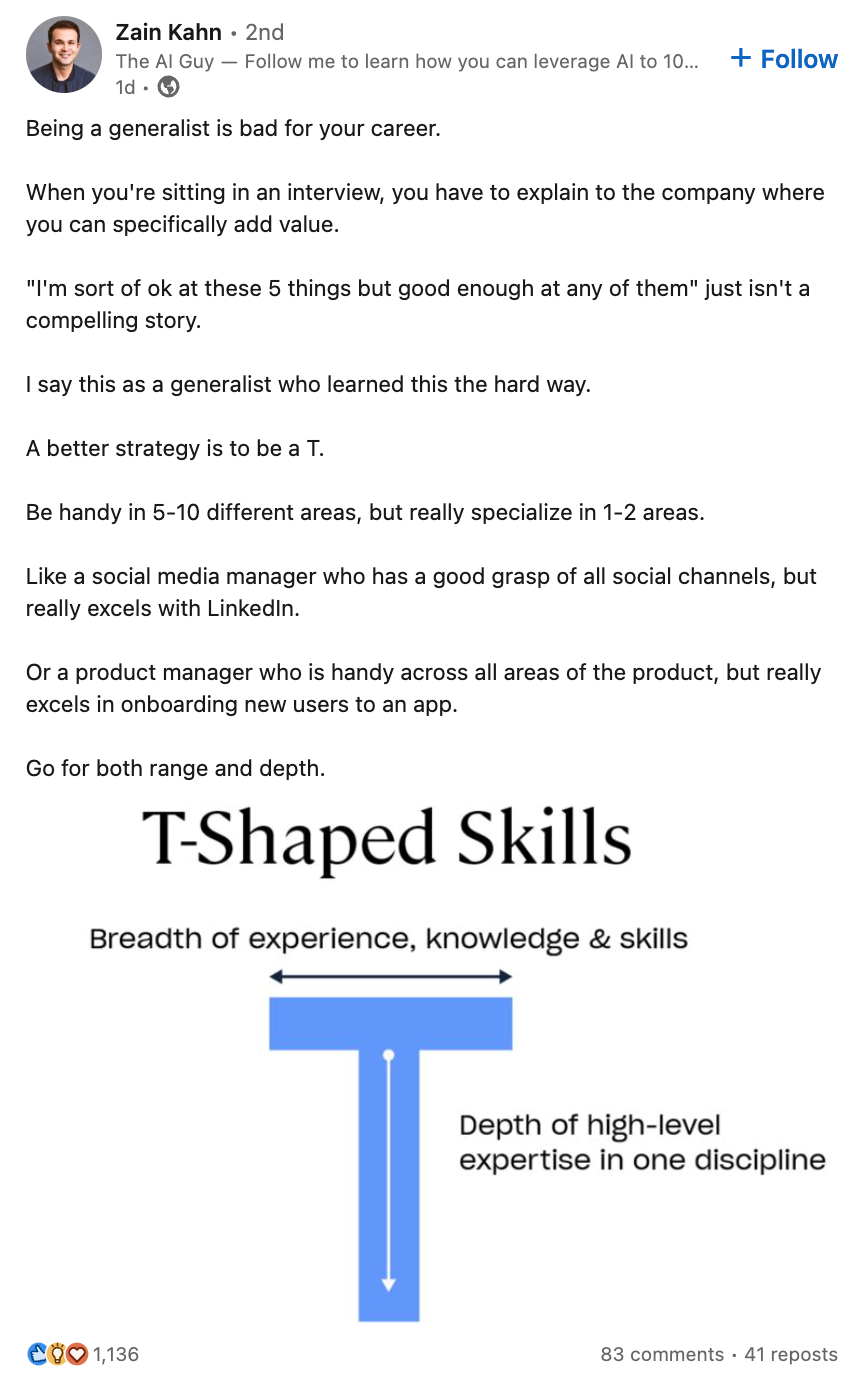
So, what’s an example of a generalist?
Generalists tend to fill roles like:
- Business operations
- Sales
- Management
- Digital Marketing
- Research
- Recruitment
Must-have skills for generalists in today’s job market
Though a generalist doesn’t deep dive into a particular specialization, they often have a bag of tricks they take from role to role — a few core transferable skills on which they rely. For example:
- Copywriting skills help you create a compelling message for internal or external purposes.
- A basic understanding of sales helps you understand how to connect with customers.
- Data analysis is essential in nearly every industry and department in today’s digitized business world.
- Core product knowledge is something they need to pick up asap when they begin a new challenge or role.
- People management skills are helpful for those in leadership roles but also for any type of team collaboration.
- Good communication skills never go amiss when you’re working with fellow humans!
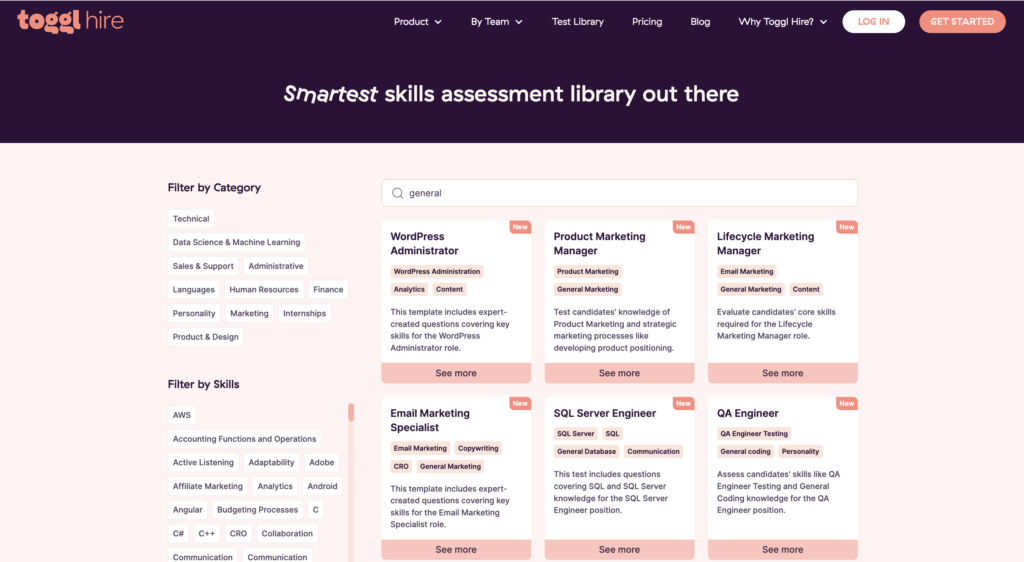
What is a Specialist?
A specialist is someone who has a high level of expertise and a narrowed focus in a particular area or field. They often have a narrowly defined job and a narrower skill set than a more generalist career, which can result in career inflexibility.
Typically, specialists tend to have followed a more traditional educational path with advanced qualifications, such as a Masters or Doctorate in Quantum Mechanics, and as a result, enjoy better pay than generalists.
Advantages of hiring a specialist:
- They’ve got more credibility as they’re a subject matter expert in their field.
- Providing in-depth knowledge and expertise for a particular task or niche project.
- They can hit the ground running on a specialized project because they have a deep understanding of the specific area or field and would require less training than a generalist.
- They can share their vast knowledge and skills and help mentor juniors.
- They can become a thought leader for your organization or industry.
- A good specialist can amass more internal power and act as an advocate for complex issues as they’re regarded highly by their peers.
Disadvantages of taking in specialists:
- Salaries tend to be higher than generalists.
- Not as easy to shift into another role if the company or team needs change.
- Less suited to a startup or small business where everyone is required to try their hand at a variety of tasks.
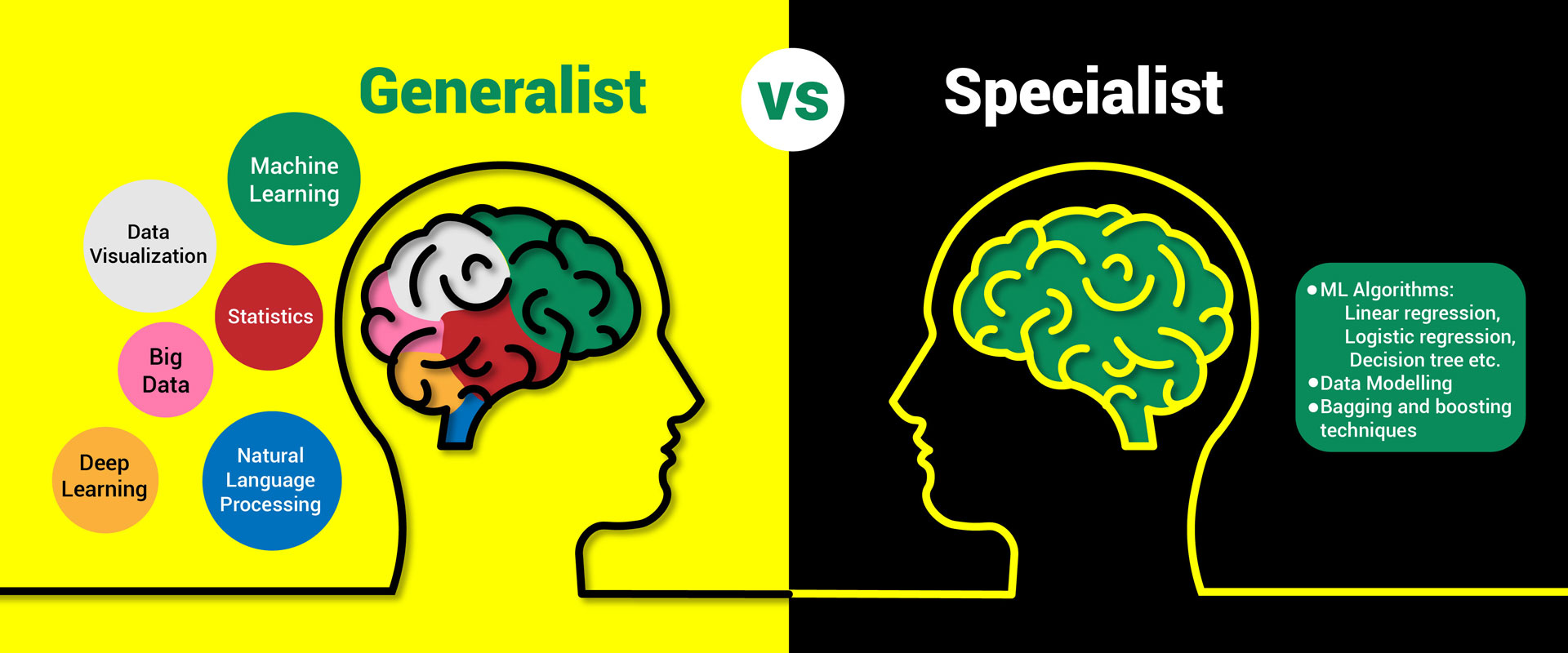
Let’s look at examples of Specialist roles
Specialist positions tend to crop up a lot in the technology field but also pop up in other areas with a more narrow focus.
- Backend Developer
- Social Media Marketing Specialist
- Illustrator
- AI Engineer
- Software Quality Assurance
- Loss Prevention Specialist
- Seasoned Employment Lawyer
- Environment Health Safety (EHS) specialist
But the categories of generalist and specialist go deeper. Let’s explore a few more skill-set types your team may need to understand better to flourish.
What about I and T-shaped skills and other employee types?
When you hire the right type of employee that matches your business needs, you can boost the levels of energy, innovation, and productivity of teams.
This is why you’ll be happy to learn that employees (or rather their skills) literally come in all different shapes and sizes!
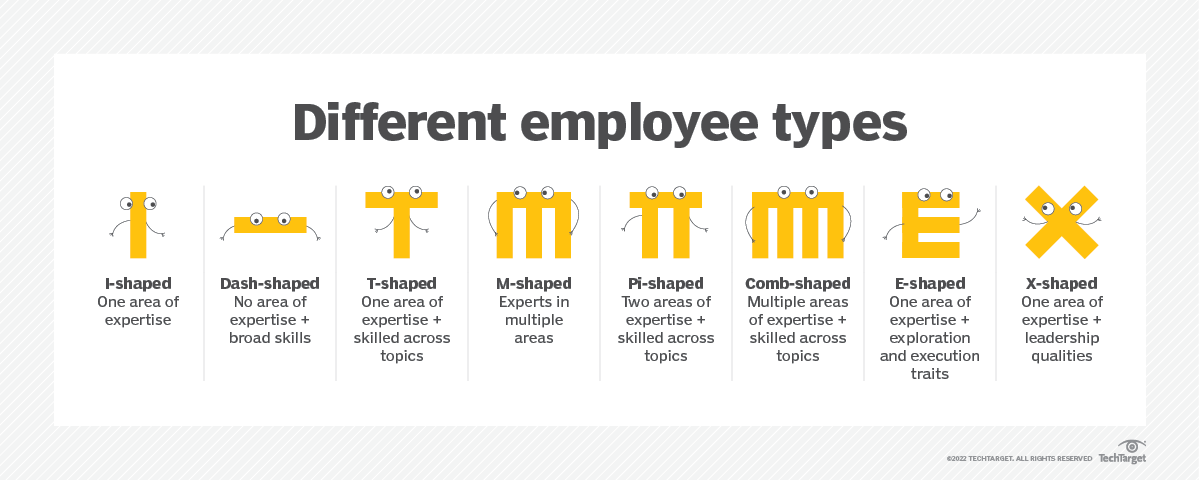
Better job security for T-shaped employees
Generalists are also known as T-shaped employees, or workers that have a wide range of skills. However, T-shaped employees also specialize in one particular area, even though those skills are transferable across domains.
A content writer that specializes in B2B technology content is an excellent example of a generalist career. They can transfer their skill set across different industries and B2B companies as easily as copy-paste.
Another example is a programmer that knows multiple programming languages. Forbes believes that nowadays, generalists triumph — and are the future of work!
T-shaped employees excel in their core responsibilities and also perform other tasks effectively. In addition to technical skills — like proficiency in programming or design expertise — T-shaped folks also possess cognitive skills like emotional intelligence and creativity. Their ability to contribute, pinch-hit and problem-solve makes them high-performers who can boost an org’s overall productivity.
Forbes | Source
The benefits of roping in more T-shapes include:
- Improving communication and collaboration between teams
- Breaking down knowledge silos for better continuity
- Increasing the employee and the company’s level of agility and efficiency
The specialized world of I-shaped employees
Your specialists are also known as I-shaped employees. In other words, their area of expertise is narrow, like the letter (no surprise there!).
Specialists have a single specialty or focus. They do not know much about different disciplines, and they prefer to work in one single job type. That is why they are depicted with the letter “I” which represents their deep knowledge and experience in one area.
Source
I-shaped specialists could include roles like a PHP Laravel Developer, a D365 specialist, or a Conversion Rate Optimization specialist.
But what about the managers and leaders in organizations – do I or T-shaped employees make the best leaders?
According to Harvard Business Publishing, I-shaped leaders “have deep functional expertise—the vertical line—but lack the skills or incentives to collaborate with others.”
It seems that characteristics from both of these two categories work best for today’s business leaders — a thorough knowledge of high-level strategy and operations and expert knowledge that helps motivate their team and improves business outcomes.
Good leaders are often a combo of I and T-shaped!
Are there other letter-shaped employee types out there?
Yes, let’s take a look at the rest of this employee alphabet soup so that you can make a more informed decision on your company’s next hire.
E-shaped: an expert in one area but also has skills in other areas. The ‘E’ stands for what they’re all about — expertise, experience, exploration, and execution.
X-shaped: one core area of expertise but with strong leadership skills.
X shaped employees have a deep expertise built on solid credibility but can also lead diverse teams to accomplish a goal. These employees may work less on their original expertise as they evolve into management and leadership positions and begin to deal more with strategy and people. Usually these people tend to be focused on strategy and team management, rather than the coalface design work, plus the ability to lead a diverse team to achieve a common goal.
Source
M-shaped: more than one area of specialty. These folks will add a lot more value in a high-performance cross-functional team, such as a sales-marketing taskforce team that has a lofty sales target to reach quickly.
Pi-shaped: two areas of deep-level expertise. If you need adaptive team members, they’re a great choice – like marketers!
Comb-shaped: experts in multiple areas that can also easily collaborate across other domains. (a bit of a unicorn 🦄 if we’re being honest!)
Specialist vs Generalist: how to hire the right fit for your team?
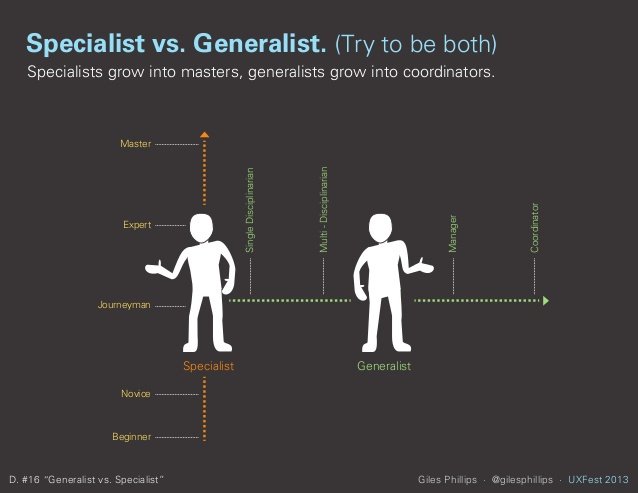
There is a definite place for both your generalists and specialists in a business. But depending on your business needs and budget, one may be a better fit over the other.
Another core factor that influences this decision is the size of your organization. Smaller organizations or startups typically need more generalists initially, as tasks are often all equally important and all-hands in nature.
As organizations grow larger, oftentimes, they begin to need more specialists on board and start to swap out the generalists for specialists.
Let’s look at a marketing department as an example. Once an organization has gotten past hiring their first marketing person, the team will need a few generalists, including a content writer (that can write blogs, emails, and social media) and a graphic designer with equally broad design skills.
But then, as the organization grows, so do the demands on marketing and the team. Now, you’ll start needing more specialized roles, too, such as a paid media specialist, a product marketer, a social media manager, and an SEO strategist.
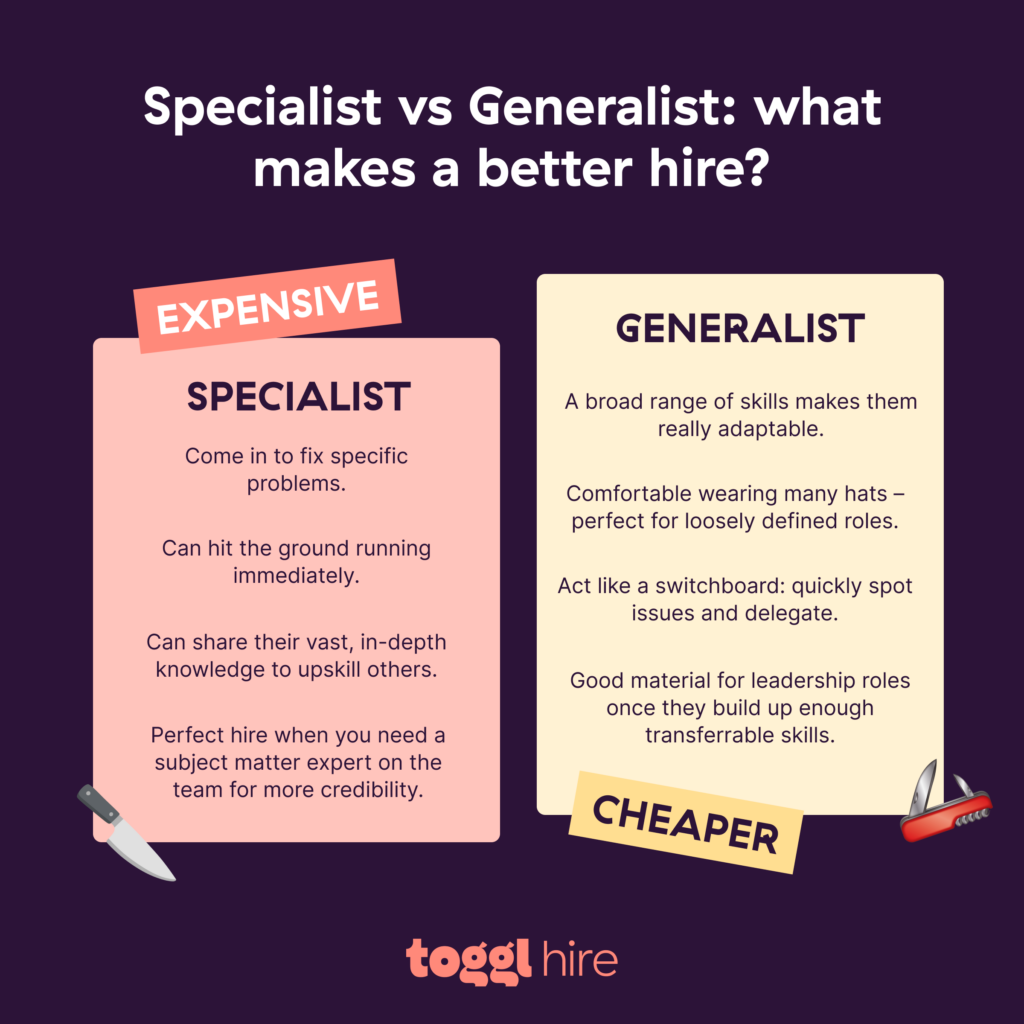
When is the right time to hire a specialist?
Key indicators signaling that it’s time to start hiring specialists include:
- a company that’s growing fast or about to launch a new product,
- when taking on a very specialized new project,
- when breaking into a new market segment.
Depending on the exact business need, the company may require a few specialists to fill the critical roles that no current employees have the necessary in-depth knowledge and skills for.
How do you know when to hire a generalist for your team?
Unless you require a clearly-defined specialist skillset to fulfill a specific role, hiring a generalist may be a better fit. In many organizations, the majority of positions are filled by generalists. They tend to earn lower salaries than specialists, which helps organizations keep a handle on their overall staffing budget.
Using skill-based assessments to decide between generalist vs. specialist skills
Whether you’re hiring generalists or specialists, skills-based assessments can help you reel in the best candidates for the role.
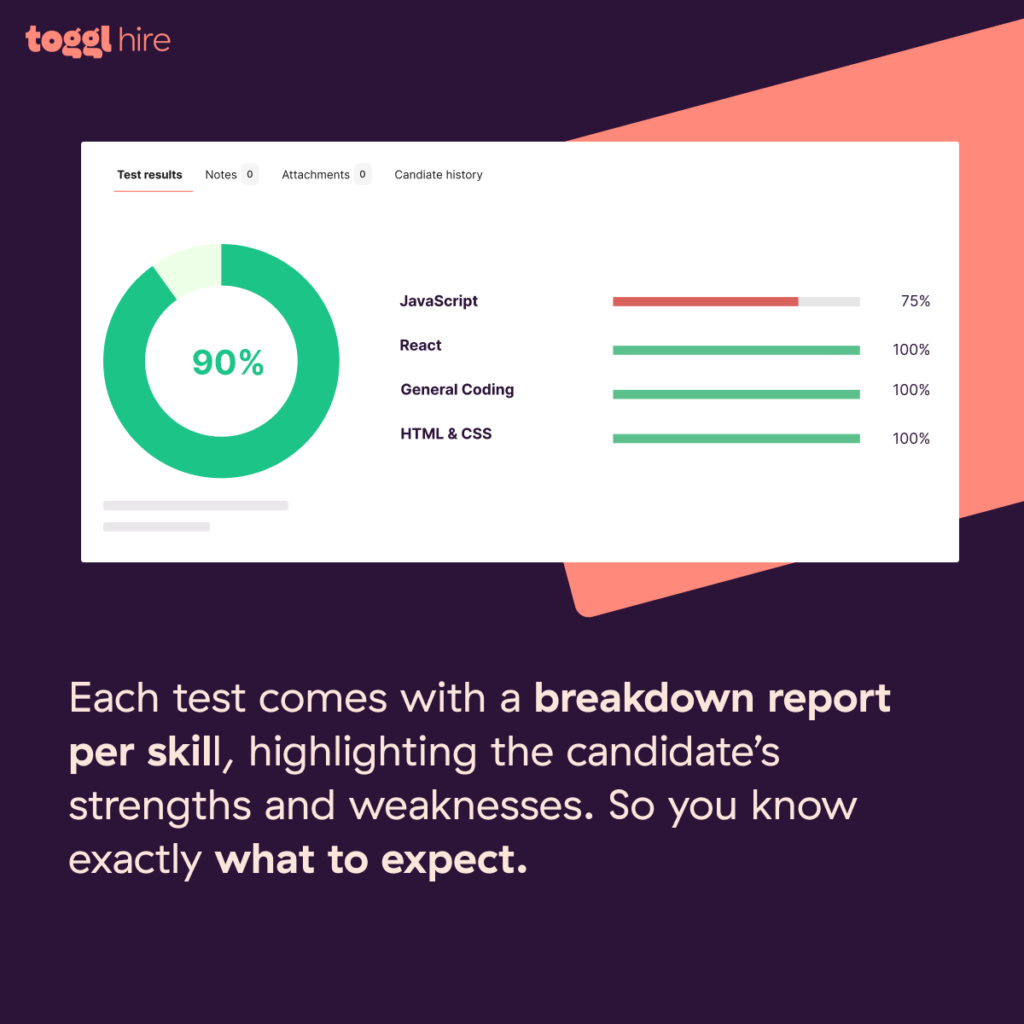
Our skills assessment platform simplifies and streamlines the hiring process. You can go from 500 to 50 applicants at the click of a button, leaving the candidates with the right general or specialist skills in the net!
So… swiss-knife or bread knife? Try our skills assessments for free and see what candidate profile meets your needs!
Juste loves investigating through writing. A copywriter by trade, she spent the last ten years in startups, telling stories and building marketing teams. She works at Toggl Hire and writes about how businesses can recruit really great people.



